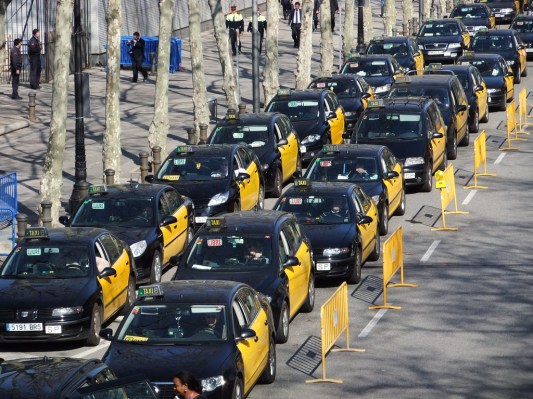Taxi drivers in Spain are striking today in cities including Madrid, Barcelona and Valencia to protest at what they see as the exploitative practices of ride-hailing transportation apps Uber and Cabify.
Cab drivers in Barcelona are staging a 24 hour strike and will be taking their distinctive black and yellow cars to Madrid to take part in a demonstration in the centre of the city planned for midday, according to El Pais. A shorter taxi strike also took place in Valencia this morning.
It’s the second such anti-Uber demonstration in Spain, and follows the company’s limited re-entry into the market last year in Madrid, with a version of the Uber service that uses only licensed drivers. Uber has not sought to reintroduce the ability to hail a ride from non-professional drivers in the market. Nor does it currently offer its carpooling service, UberPool.
But it looks to be playing a longer game of attrition in the market — focused on lobbying for regulatory change so that it could reintroduce other services in future. In the first instance Uber is seeking to get a cap removed on the number of licenses for private hire vehicles — currently set at one per 30 taxis — to enable more Ubers to operate. Hence taxi drivers being angry.
Anger has also apparently been directed at Uber rival Cabify, which has claimed it’s been the target of various acts of aggression in the market — including having nine of its cars set on fire in Sevilla earlier this month.
In a blog post on its Spanish website yesterday Uber argued that eliminating the cap on the VTC licenses necessary to rent a vehicle with a driver would “reduce urban transport prices, create thousands of jobs and favor more sustainable cities”. Earlier this month it also published a report it commissioned which claims there would be “significant economic and environmental benefits” flowing from the liberalization of VTC licenses.
The background here is that in December 2014 a Madrid judge ordered Uber to cease all activity in the city, following a legal challenge by a local taxi association on unfair competition grounds. Later that same month Uber suspended the UberPop ride-sharing service after receiving a court injunction — taking a rather different tack vs its earlier combative default, when it had vowed repeatedly to ignore court orders banning its services in multiple markets.
Instead it’s focused on complying with local transport regulations and only offering a limited service where it can while it tries to lobby for regulatory change.
In Barcelona in 2015 the city government changed the law to block Uber, bringing in big fines and the ability for police to impound infringing cars for three months — measures which have essentially kept the service off the streets. Although Uber did launch UberEats in the city in 2014, presumably to try to keep a pool of drivers ‘warm’ in the hopes of a favorable regulatory shift in the future.
But it ended up pulling the service later in the same year — saying it wanted to concentrate on working with cities to change the rules around passenger transportation services, and — in its words — “facilitate a new model in Spain that contributes to the improvement of urban mobility and offers new job opportunities to thousands of people”.
One Barcelona taxi driver we spoke to yesterday who was planning to strike today held no truck with Uber’s claims of socio-economic benefits, denouncing what he described as the company’s exploitative labour practices. He also claimed Uber is providing unrealistic earnings figures to try to lure new drivers onto its platform, and is intentionally keeping prices low now to put pressure on taxis to try to destroy the service.
“Taxis are a public service,” he added.
In a statement about the taxi strike, an Uber spokesperson told us: “We respect the right of the taxi sector to demonstrate. But it is undeniable that urban mobility is changing very quickly across the world. We want to address a fair transition process with the public administration and taxi sector that promotes a new model of mobility in our cities, but also ensures that no one is left behind.”
La Vanguardia reports that the Spanish Taxi Federation has called for the creation of a publicly run digital platform to allow customers to book a taxi anywhere in Spain — to improve “the quality and competitiveness” of the service and to focus it on tourism as a strategic sector.
It also wants public-private funding to help drivers leave the profession and retrain. The group intends to present their ideas in a document they will hand to Congress today, following the march in Madrid.
Two more strikes are planned by Spain’s taxi drivers for July, according to Euro Weekly. A Barcelona taxi association spokesperson told it the group has not ruled out an indefinite strike.
